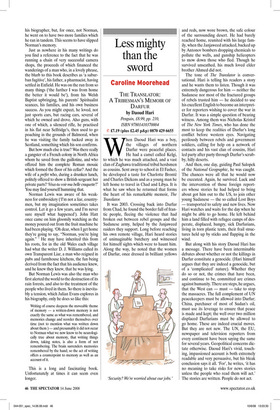Less mighty than the sword
Caroline Moorehead
THE TRANSLATOR: A TRIBESMAN’S MEMOIR OF DARFUR by Daoud Hari Penguin, £8.99, pp. 210, ISBN 97801410370004 ✆ £7.19 (plus £2.45 p&p) 0870 429 6655 When Daoud Hari was a boy, the villages of northern Darfur were peaceful places. He had a camel called Kelgi, to which he was much attached, and a vast clan of Zaghawa traditional tribal herdsmen as cousins. Sent away to school in El Fasher, he developed a taste for Charlotte Brontë and Charles Dickens and as a young man he left home to travel in Chad and Libya. It is what he saw when he returned that forms the heart of his remarkable memoir, The Translator.
It was 2003. Crossing back into Darfur from Chad, he found the border full of frantic people, fleeing the violence that had broken out between rebel groups and the Sudanese army, helped by the Janjaweed raiders they support. Long before reaching his own remote village, Hari heard stories of unimaginable butchery and witnessed for himself sights which were to haunt him. Along the way, he noted that the women of Darfur, once dressed in brilliant yellows and reds, now wore brown, the safe colour of the surrounding desert. He had barely reached home, reunited with his large family, when the Janjaweed attacked, backed up by Antonov bombers dropping chemicals to pollute the wells, and gunship helicopters to mow down those who fled. Though he survived unscathed, his much loved elder brother Ahmed did not.
The tone of The Translator is conversational. Hari is telling his readers a story and he wants them to listen. Though it was extremely dangerous for him — neither the Sudanese nor most of the fractured groups of rebels trusted him — he decided to use his excellent English to become an interpreter for reporters wishing to cover the war in Darfur. It was a simple question of bearing witness. Among them was Nicholas Kristof of The New York Times, who has done the most to keep the realities of Darfur’s long conflict before western eyes. Navigating perilously between rebels and government soldiers, calling for help on a network of contacts and his vast clan of cousins, Hari led party after party through Darfur’s scrubby, hilly deserts.
And then, one day, guiding Paul Salopek of the National Geographic, he was caught. The chances were all that he would now be executed. Again, he survived. Luck and the intervention of those foreign reporters whose stories he had helped to bring about got him out to the US, to join other young Sudanese — the so called Lost Boys — transported to safety and new lives. Now Hari watches and waits for the day when he might be able to go home. He left behind him a land filled with refugee camps of desperate, displaced, hungry, sick Darfurians, living in torn plastic tents, their frail structures held up by sticks and flapping in the wind.
But along with his story Daoud Hari has a message. There have been interminable debates about whether or not the killings in Darfur constitute a genocide. (Hari himself argues that they are indeed a genocide, but of a ‘complicated’ nature). Whether they do so or not, the crimes that have been, and continue to be, committed are crimes against humanity. There are steps, he argues, that the West can — must — take to stop the massacres. The full complement of UN peacekeepers must be allowed into Darfur; China, purchaser of most of Sudan’s oil, must use its leverage to ensure that peace is made and kept; the well over two million displaced Darfurians must be allowed to go home. These are indeed crucial moves. But they are not new. The UN, the EU, newspaper and television reporters from every continent have been saying the same for several years. Geopolitical concerns dictate otherwise. Daoud Hari’s vivid, touching, impassioned account is both extremely readable and very persuasive, but his bleak conclusion says it all. ‘For’, he writes, ‘it has no meaning to take risks for news stories unless the people who read them will act.’ The stories are written. People do not act.


















































































 Previous page
Previous page